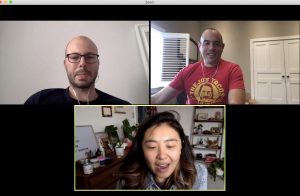Believe it or not, there was a time where all the world’s information wasn’t a simple search away. You’d go to your copy of the newspaper to find out what was playing at your local movie theatre. In the time before you could binge an entire season of a show on Netflix, you’d have to look at this thing called a TV Guide to find out when a new episode of your favourite show was on – and wait a week to see the next one. If you wanted to get pizza delivered, you’d call on a landline phone to place your order.
But then the search era began. The world’s information was categorized, filtered and organized so we could know anything, anytime. We’re in the era of Google, Bing and Duck Duck Go. Everything you need to know is a simple click away.
That was until COVID-19 shutdowns started happening.
Business hours, event listings and other online information suddenly became unreliable. Those once-trusted search listings weren’t being updated in real time. It wasn’t just not knowing if your favourite shawarma place was doing curbside pickup or what hours a retailer was open. Staples like flour and fresh produce had become prized finds on grocery store shelves.
Two local tech workers found themselves looking for a solution to this problem. Kyryll Odobetskiy and Amanda Cheung at the TD Lab inside the Communitech Hub had been sharing tips on stores and restaurants during the first weeks of the closures. “When the craziness started, we’d schedule a delivery from some of the bigger grocery stores, but there were always crazy backups,” said Odobetskiy. On a physically distant safe drive through St. Jacobs, Odobetskiy noticed a small variety store that had fresh eggs and produce. Thinking it was a good resource for others, he shared with his team.
TD Lab Director Chris Halabecki had been asking the team what they could do to support the community during COVID-19. “Forward-looking solutions are more important than ever. What can we do right now to give back?”
The TD Lab team started brainstorming ideas. One that snowballed quickly was the idea of helping small businesses connect with locals looking for places to support and shop from. “We were seeing people on our team struggling with where to get coffee, produce, etc..,” said Halabecki. The team knew many local businesses were struggling during closures. They also recognized that, while many people were having issues finding products at large stores, they weren’t aware of many of the small, locally-owned businesses in our community.

Google Hangout interviews are the new normal
TD Lab UX designer Amanda Cheung pointed out the need to support local businesses during COVID-19 closures. “When we’re looking for groceries, why are we looking only at these big box places? Local markets are shut down. What’s available? What do they deliver? Is curbside pickup available?”
Initially, the team used an Airtable database to put together a list of local places that were open. “We built the first iteration in a few days. It was a little prototype and we got some cool feedback early on,” said Odobetskiy. “We shared with TD and they were excited about it, even saying that they wished they had it for their city.”
The project quickly picked up steam. “We had rolled it out by word of mouth and the next day there were over 500 visitors,” said Halabecki. The team decided to move the project to a website and created HeartLocal. TD Lab – like many of the innovation labs at Communitech – is focused on digital transformation. With this background, Odobetskiy, Cheung, and other team members saw this need as one where businesses didn’t necessarily need help setting up e-commerce – just an opportunity to have an online presence and be discovered by new customers.
Odobetskiy pointed out that search results weren’t a consistent source of correct information for many local establishments. “On search, Arabella Park is closed. On Twitter, someone said they do beer and burger pickup. Business hours all got messed up, pickup options weren’t listed. Some places are doing delivery that never have before. Some say they’re open, but they’re closed.”
As submissions from the team and the community came in, Odobetskiy and Cheung started to discover not only new places but the owners behind those businesses. One discovery was La Fromagerie on Lexington which opened right before COVID-19 hit locally. “My wife called the owner, Cindy, to see if they were open,” said Odobetskiy. The fromagerie is open and provides curbside pickup for orders.
“The thing that makes the community are the people behind the businesses,” added Cheung.
“People were asking about Fromagerie on Lexington and there wasn’t much online because they were so new.” Curiosity drove Cheung to call the store’s owner to learn more. “I asked if I could come and do a socially distant photoshoot and we chatted for 30 minutes.” Cheung turned that conversation into the first of a series of entrepreneur stories that are on the site now.
“It’s all so organic,” added Odobetskiy. “We just reach out to a few places to get details for the places, who’s the owner, why’d they start it.”
The site is more than a response to COVID-19. It’s about discovering local places where we can continue to shop after restrictions are lifted.
“We all want to go back to normal,” said Cheung. “People know what’s going on with social distancing and other restrictions. This gives us a chance to bring the community front of mind.”

